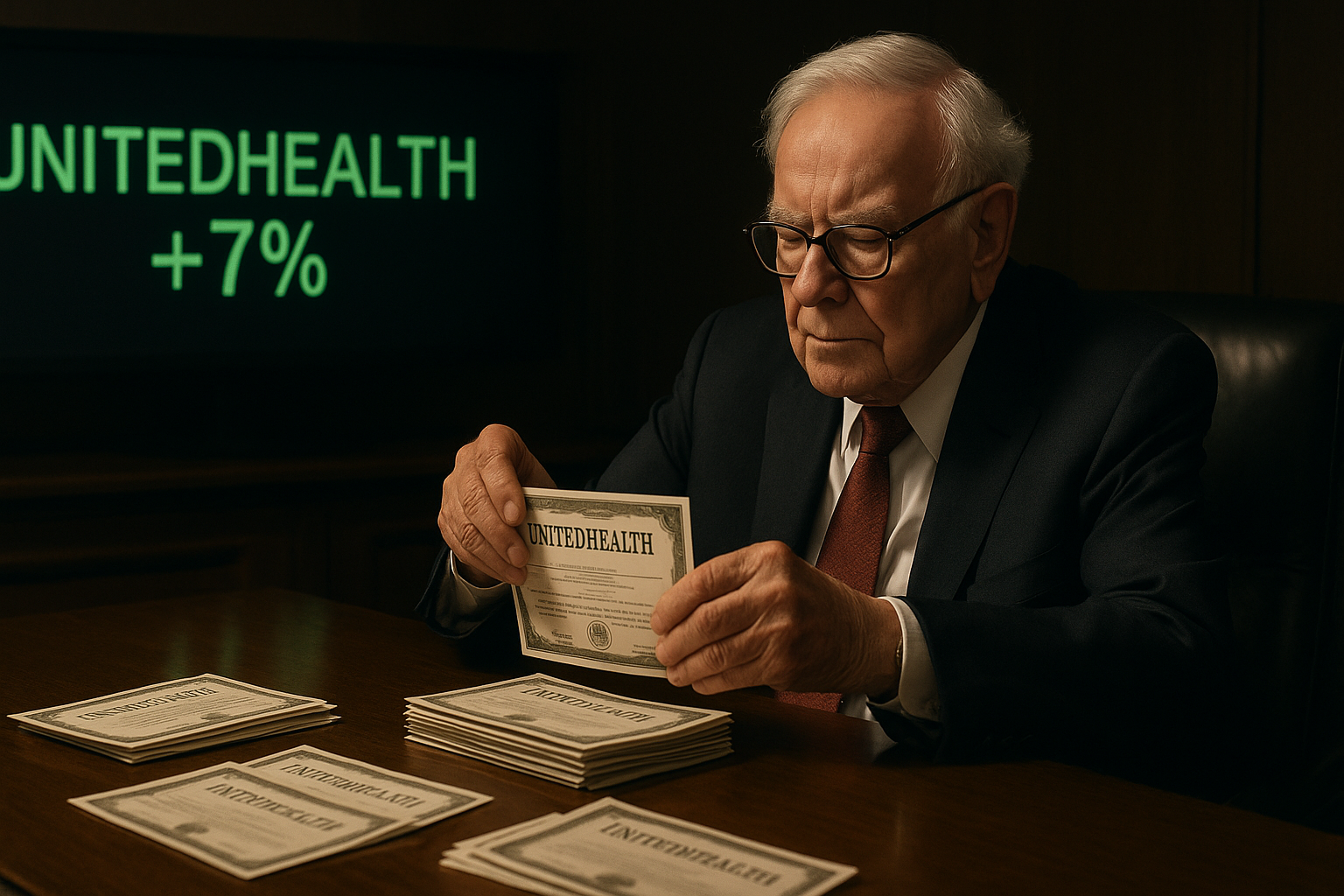Markets did a double-take yesterday after UnitedHealth shares suddenly jumped 7% in after-hours trading. The cause? Word finally leaked that Warren Buffett—yes, that Warren Buffett—had secretly built a $1.6 billion stake in the healthcare behemoth without anyone noticing until, well... now.
There's something almost charmingly retro about the whole affair. In today's hyper-connected financial ecosystem where Reddit users dissect 13F filings before professional analysts can blink, the 93-year-old Oracle of Omaha still managed to slip past market watchers while methodically accumulating shares in one of America's largest health insurers.
The collective market response? A bewildered "how the hell did we miss this?"
The Art of Keeping Secrets (Legally)
So how does possibly the world's most scrutinized investor quietly amass a billion-dollar position without setting off alarm bells? The answer lies in a regulatory loophole—perfectly legal, mind you—that Berkshire has cleverly exploited before.
The SEC actually allows big institutional investors to delay disclosing certain positions if revealing them would cause "substantial harm" to their investment strategy. Buffett, it seems, received the regulatory green light to keep his UnitedHealth shopping spree temporarily under wraps.
This isn't his first rodeo with the delayed disclosure game. Back in 2020 (feels like a lifetime ago, doesn't it?), Berkshire used this same approach to quietly build massive positions in Japanese trading houses before dropping the revelation bomb all at once.
It's classic Buffett playbook stuff—patient, methodical, and cunningly designed to avoid paying the infamous "Buffett premium" that typically gets baked into stock prices the moment markets catch wind that he's buying.
Having covered Berkshire's investment strategies for years, I've noticed Buffett has always had an uncanny ability to find businesses with economic moats—and UnitedHealth certainly fits the bill. The health insurance business offers steady cash flows, high customer switching costs, modest capital requirements, and despite occasional political thunderstorms, provides an essential service that's not going anywhere.
Healthcare When Nobody's Looking
What makes this move particularly fascinating is the timing. Healthcare stocks—especially insurers—have been trading at surprisingly modest multiples lately, despite delivering consistent results quarter after quarter.
Why? Political uncertainty, Medicare rate worries, and the ever-present cloud of potential healthcare reform have kept many investors fidgeting on the sidelines.
Buffett, meanwhile, is making what looks like a quintessential value play. While others fret, he's betting big that a well-run, market-dominating healthcare company with diverse revenue streams will keep printing money regardless of which way the short-term political winds blow.
Worth noting (and something many initial reports missed): UnitedHealth isn't just an insurance company anymore. Their Optum division—handling everything from pharmacy benefits management to care delivery and data analytics—now generates nearly half the company's profits. This makes Buffett's investment far more sophisticated than a simple insurance sector bet.
Look, there's also something fundamentally "Buffettian" about investing in a company that benefits from America's uniquely expensive healthcare system. As he once said about his BNSF Railway investment: "It's far better to have a goose that keeps laying eggs than a goose that just grows rapidly."
UnitedHealth? It's been laying golden eggs for decades—with a five-year growth rate hovering around 13% and a dividend that keeps getting fatter.
The Market's Psychological Quirks
The after-hours price surge shows something I've always found fascinating about Buffett's market influence—the man still moves markets just by showing up.
Despite being in his nineties and sometimes lagging the broader market (though who hasn't recently?), Buffett's stamp of approval continues to send stock prices northward in dramatic fashion.
What's particularly amusing about yesterday's jump? This wasn't even new buying! These purchases happened months ago. The market essentially freaked out over old news, repricing an asset based solely on information about past transactions rather than any actual change in the company's fundamentals.
It's the perfect illustration of how markets incorporate both hard data and fuzzy human sentiment in ways that often make pure rationalists tear their hair out.
For folks already holding UnitedHealth shares, this creates an interesting dilemma. They now own stock in a company with the coveted Berkshire seal of approval—historically a positive signal—but at prices Buffett himself might now consider too rich given the overnight pop.
Should they sell into the strength? Hold for the long haul? These are the questions that keep investors up at night... and financial journalists employed.
The Bigger Picture
The broader healthcare sector should be paying close attention. Buffett's move might signal that the smart money sees real value in an area that growth-obsessed investors have recently overlooked.
As is typically the case with Buffett, he's not just betting on a single company—he's making a larger economic observation about an entire sector. The healthcare industry, particularly insurers, might be worth another look from investors who've been chasing the latest AI darlings.
In any case, Berkshire's strategic secrecy has once again showcased Buffett's mastery of market psychology. By the time Wall Street figured out what he was doing, he'd already done it—and at prices unspoiled by the Buffett premium.
The old man from Omaha may prefer chocolate to ChatGPT, but his market timing? Still sharp as ever.
